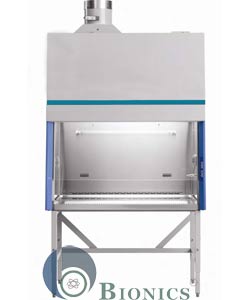How Much is it Worth For Class 2 Biosafety Cabinets
How Much is it Worth For Class 2 Biosafety Cabinets
Blog Article
Enhancing Laboratory Safety with Class 2 Biosafety Cabinets and Microbiological Protection

Modern laboratories prioritise safety for workers, materials, and environments. Whether it's handling live pathogens or sensitive diagnostics, biosafety cabinets form the backbone of contamination control.
Of all types, Class 2 cabinets are most commonly used due to their efficiency and versatility. These units are essential for labs working with infectious materials or clinical diagnostics.
Overview of Biosafety Cabinets in Laboratory Environments
Biosafety cabinets are ventilated enclosures built to protect both users and biological materials. They use HEPA filtration to remove contaminants from incoming and outgoing air.
These units are generally classified into three main types: Class I, II, and III based on containment level. Among these, Class 2 cabinets are the most versatile and commonly used.
What Are Class 2 Biosafety Cabinets?
Class 2 Biosafety Cabinets offer simultaneous protection for people, processes, and surroundings. They generate a vertical airflow that reduces turbulence and contamination.
Air is treated using dual filtration systems to ensure safe circulation and exhaust. These cabinets are suited for clinical, research, and pharmaceutical lab applications.
Key Features of Microbiological Safety Cabinets
A Class 2 microbiological safety cabinet includes several integrated safety mechanisms such as:
• High-efficiency air filters to ensure clean workspace air
• Laminar airflow that minimises disruption and contamination
• Inward airflow to keep aerosols contained
• Optional UV lights for overnight sterilisation
• Quiet operation and ergonomic design for user comfort
• Clear front panel for visibility and safety
These elements ensure safety, comfort, and efficiency in day-to-day lab tasks.
Where Class 2 Cabinets Are Used
Class 2 Biosafety Cabinets are key equipment in healthcare, molecular biology, and quality control. They are ideal for safe handling of samples during testing and experimentation.
Hospitals, research labs, and manufacturing units depend on these cabinets for contamination control.
Benefits of Using Class 2 Biosafety Cabinets
Using Class 2 cabinets offers numerous benefits for safety, accuracy, and lab hygiene:
• Protects the integrity of lab work
• Acts as a barrier between user and biohazard
• Minimises lab contamination and pollution risks
These cabinets help labs meet safety regulations while maintaining workflow.
Cabinet Types and Global Compliance
Top manufacturers ensure their cabinets meet certifications like NSF 49, microbiological safety cabinet EN 12469, and WHO recommendations. Class 2 units are sub-classified as A1, A2, B1, and B2—each with distinct airflow and exhaust features.
• Type A2: Most commonly used cabinet model
• Type B2: Exhausts 100% of air via ducting; no recirculation
Matching the cabinet type to your process is essential.
How to Select a Class 2 Safety Cabinet
Before purchasing, consider:
• The types of agents and materials handled
• Available lab space and utility infrastructure
• Ease of use, energy efficiency, and upkeep
• Warranty, training, and certification services
Working with reliable manufacturers provides peace of mind and technical guidance.
Installation and Safety Guidelines
For optimal results:
• Install the cabinet in a draft-free, low-traffic zone
• Get periodic validation from certified technicians
• Educate staff on cabinet operations and safety
Operational best practices include:
• Maintain biosafety gear protocols
• Work calmly to prevent airflow disturbances
• Wipe work areas with disinfectants regularly
• Never activate UV when humans are present
Conclusion
Class 2 biosafety cabinets are a cornerstone of any safe, efficient laboratory. They safeguard both research outcomes and operator health.
From clinical research to vaccine development, Class II cabinets support world-class laboratory practices. When investing in a biosafety cabinet, opt for trusted brands that offer end-to-end service—because safe science starts with smart containment. Report this page